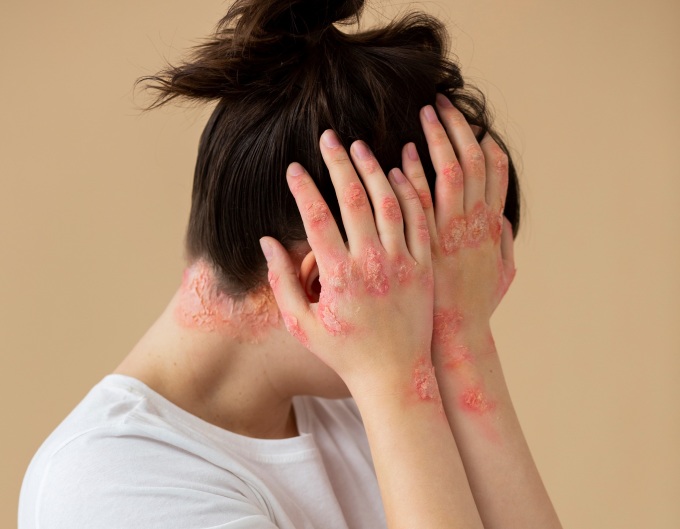Ear piercing, psoriasis, ear dermatitis, ear cancer… are conditions that can cause scaling and infection in the ear.
Ear scales are usually not serious and can heal on their own, sometimes requiring treatment with over-the-counter medications. In rare cases, ear scales can be a sign of skin cancer. Here are 9 reasons why your ear may be scaly.
Ear piercing
An infected piercing can cause the ear to crust over. A piercing that is over infected cartilage takes longer to heal because the area has no blood vessels or nerve cells. This requires medical treatment. Some ways to treat an infected piercing include: taking antibiotics, applying antibiotic ointment, rinsing with sterile saline, and applying warm compresses.
Pimples
Pimples in the ear are usually harmless. However, people should not pop them themselves because the discharge can flow into the ear, causing irritation and infection. Usually, the pimple will heal on its own, and placing a warm compress on the ear can help speed the healing process. If the pimple is itchy and painful, you can take over-the-counter pain relievers and see a specialist.
Dry ear
Dry ear skin can also cause scaling, severe dryness can cause bleeding or cracking, itching, stretch marks, and redness. Dry ear skin can be caused by climate, illness, allergies, genetics, age, or other skin conditions. Treatments include applying moisturizers, ointments, essential oils, and steroid medications.
Ear dermatitis
This is a condition of rashes and skin irritation caused by an overactive immune system, genetics, infection, or allergies. Common symptoms include rashes, dry and itchy skin, and scales inside and outside the ears and on the face. Common treatments include applying moisturizers, corticosteroid creams and ointments, and antibiotics. When you have dermatitis, you should regularly use moisturizers, reduce stress, use mild soaps, and take warm baths.
Psoriasis
Normally, skin grows and peels within a month. However, in people with psoriasis, due to an overactive immune system, scales develop in 3-4 days, new skin is constantly forming and the old skin does not have a chance to peel off properly. As a result, skin cells form at a rapid rate and pile up on the surface, leaving dry, scaly patches that sting and itch. This condition is not contagious and forms in many places on the body such as the ears, knees, elbows, eyelids, and scalp.
Reducing stress, consuming foods that are low in inflammation, and getting sunlight and using a humidifier can improve psoriasis. Applying vitamin D3 ointment, vitamin A or retinol cream, moisturizers, using special shampoos, lasers... are common treatments.

Psoriasis can cause scaling on the ears, elbows, and scalp. Photo: Freepik
Indigo
The condition typically causes dry, scaly skin on the ear or in the ear canal due to an overactive immune system, stress, allergies to perfumes and fabrics, or infection. Symptoms include itching around or in the ear, redness, swelling, and air release in the ear. The condition can affect the eardrum, causing pain and infection.
Treatment often uses medical ointments and steroid drops. Patients should avoid wearing fabrics that cause allergies, reduce exposure to dust and pet hair, avoid processed and highly inflammatory foods, limit skin creams, metals from jewelry... to avoid making the disease worse.
Heat rash
Heat rash, also known as prickly heat or milia, is a skin irritation that causes pain, tingling, and small bumps. Heat rash occurs when pores and sweat glands are blocked, causing sweat and secretions to become trapped under the skin, causing pimples and scabs on the ears and other parts.
The disease is common in infants and young children. Treatment includes cooling and drying, applying ointments when irritation and swelling or scabs appear. Patients with rashes that do not clear up in 3-4 days need to be hospitalized.
Cholesteatoma
This is a type of dermoid cyst, usually located in the middle ear and mastoid bone in the skull. It is congenital or caused by chronic ear infections. If the cyst grows or becomes infected, it can affect the structure of the ear, hearing, and facial muscles.
Symptoms of this dermoid cyst may include: hearing loss in one ear, ear discharge, dizziness, and a feeling of fullness and pressure in the ear.
Skin cancer
Although rare, scales on the ear can be a sign of skin cancer (basal cell carcinoma and squamous cell carcinoma). Too much exposure to sunlight and radiation, old age, and smoking can increase the risk of skin cancer.
Other symptoms of ear skin cancer may include: a slowly growing pearly white bump on the ear, a painful or bleeding ear ulcer, hearing loss, dizziness or facial paralysis. If a person has a crusting in the ear that does not improve within 4 weeks, they should see a doctor for a checkup.
The affected areas of the ear should be cleaned regularly with soap and warm water and patted dry. Avoid excessive rubbing or scratching, avoid poking anything into the ear and rinse with warm water, always keep your hands clean when applying medication.
Mai Cat (According to Very Well Health )
Source link
































































































Comment (0)